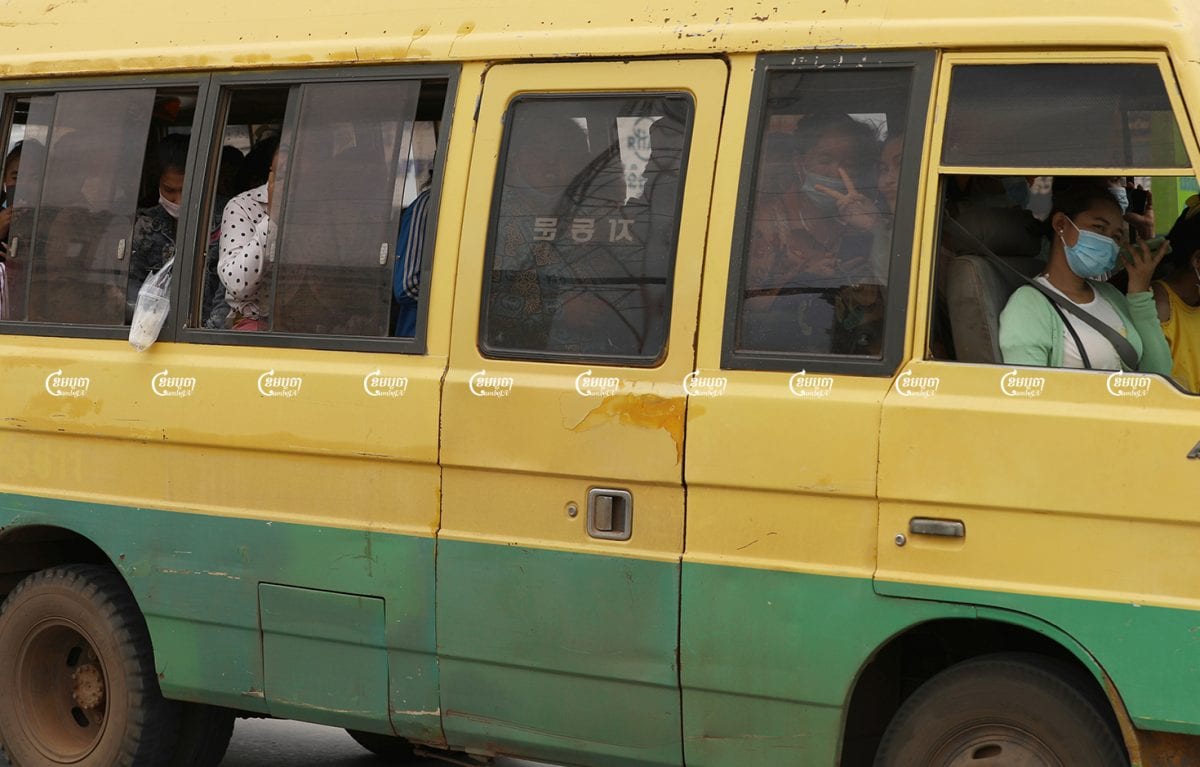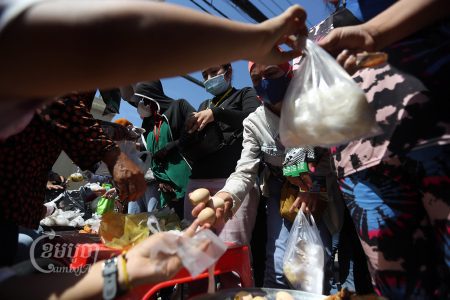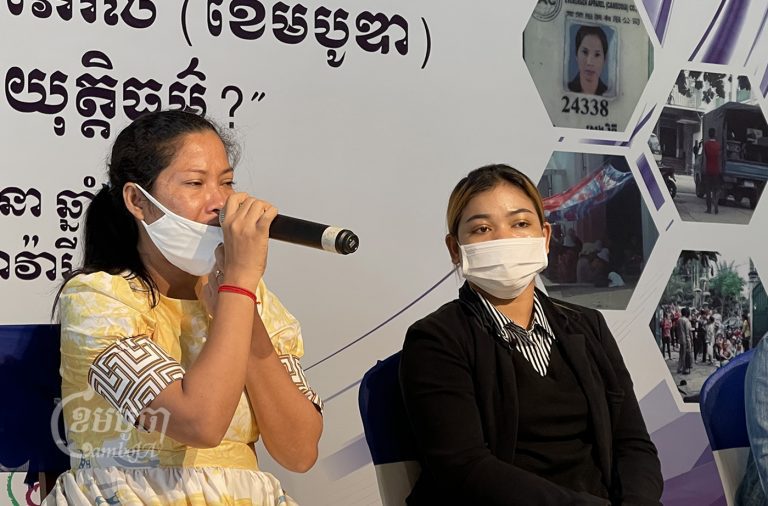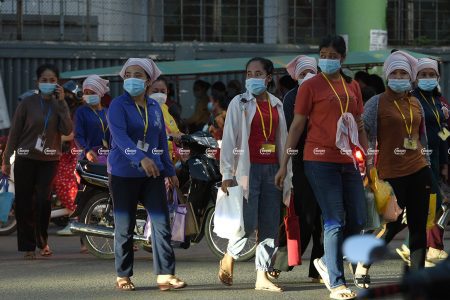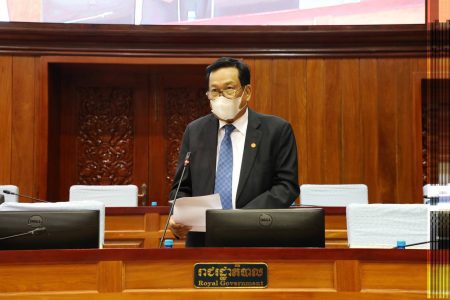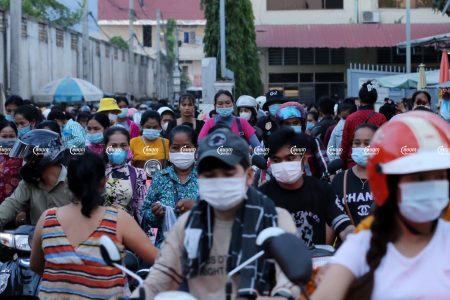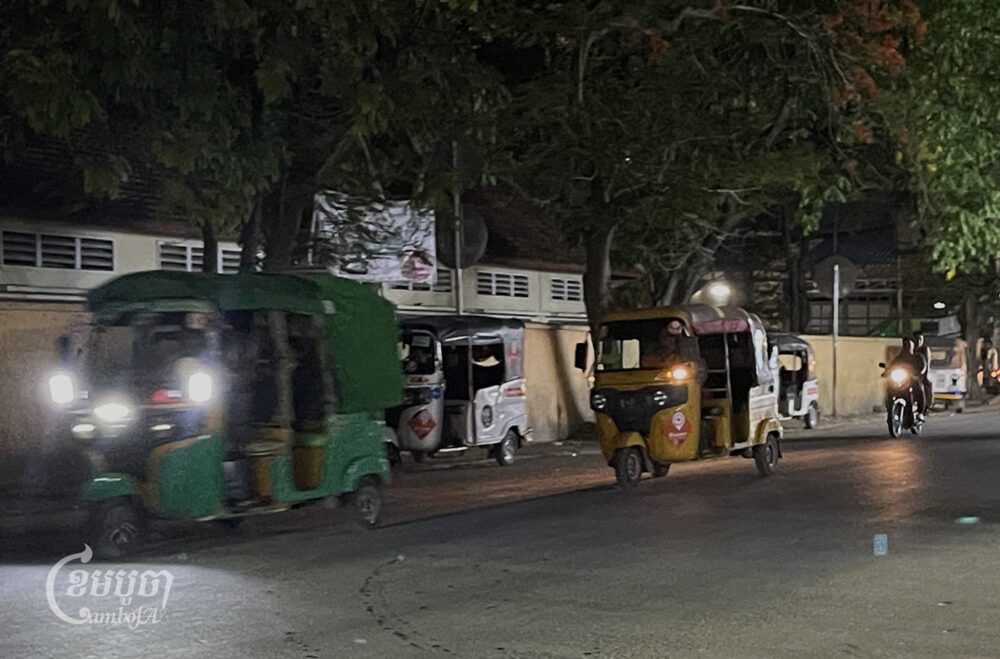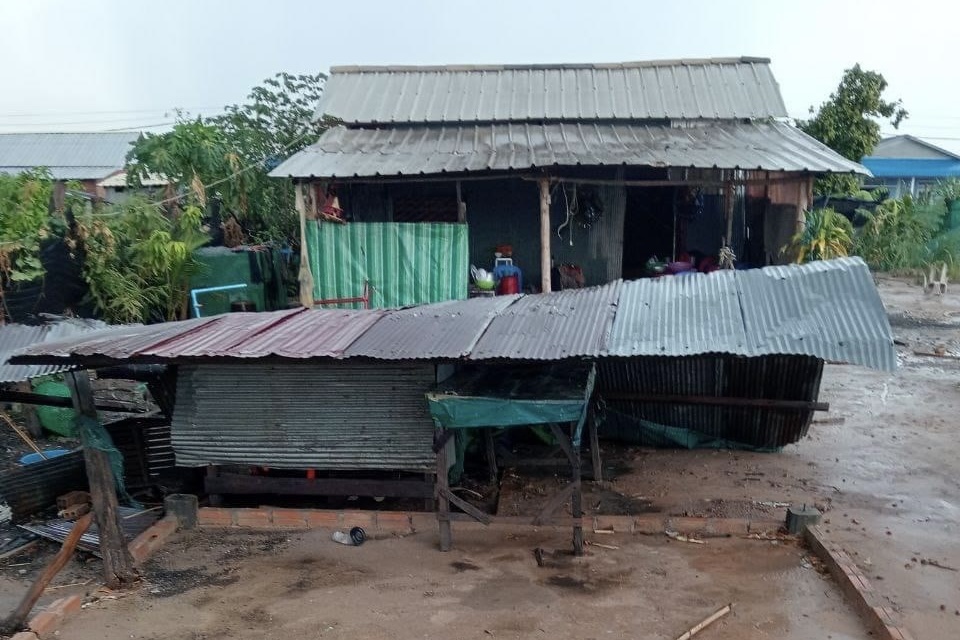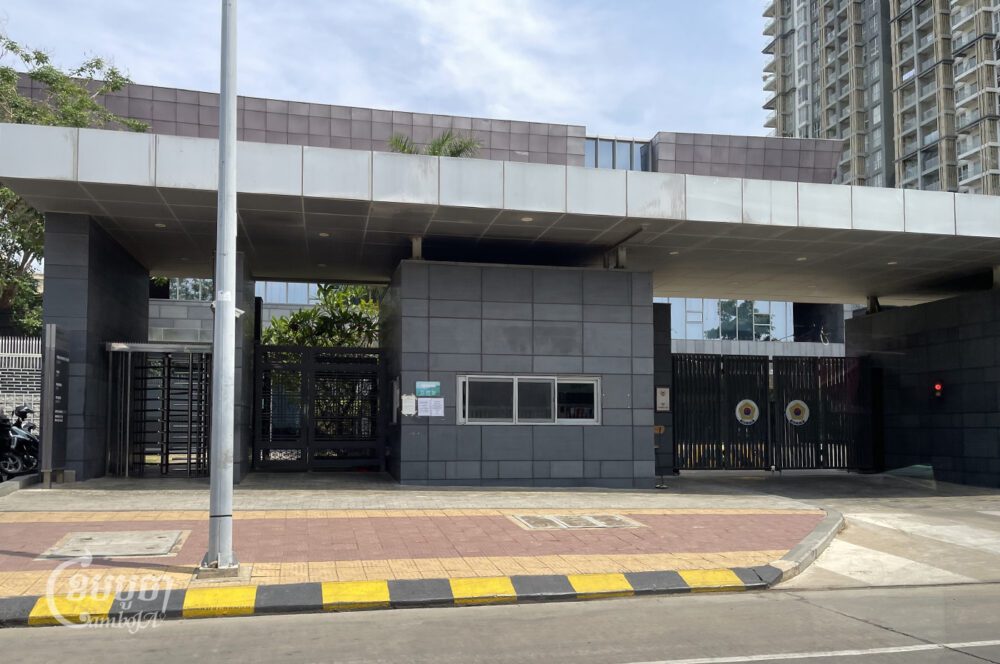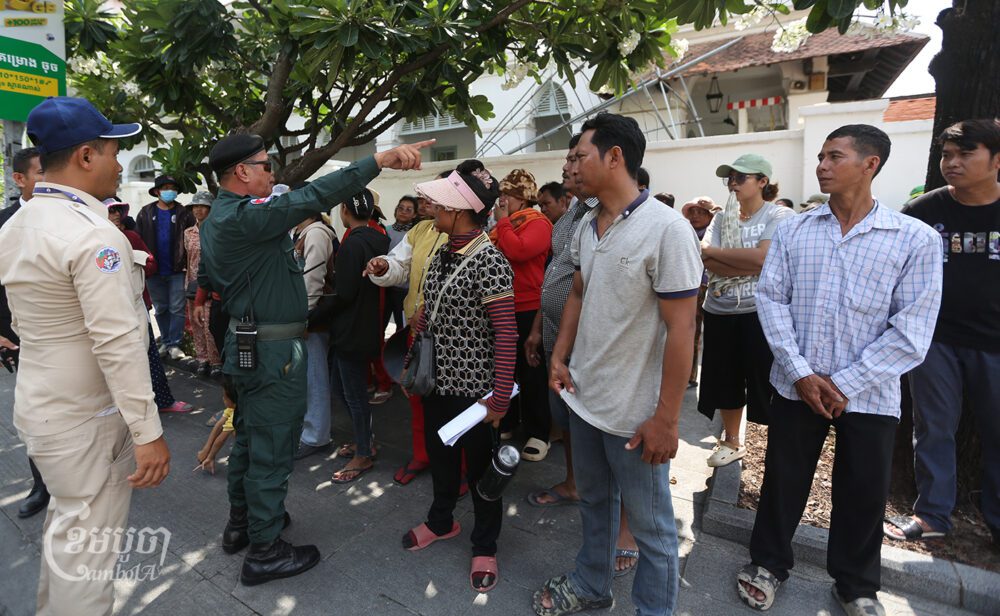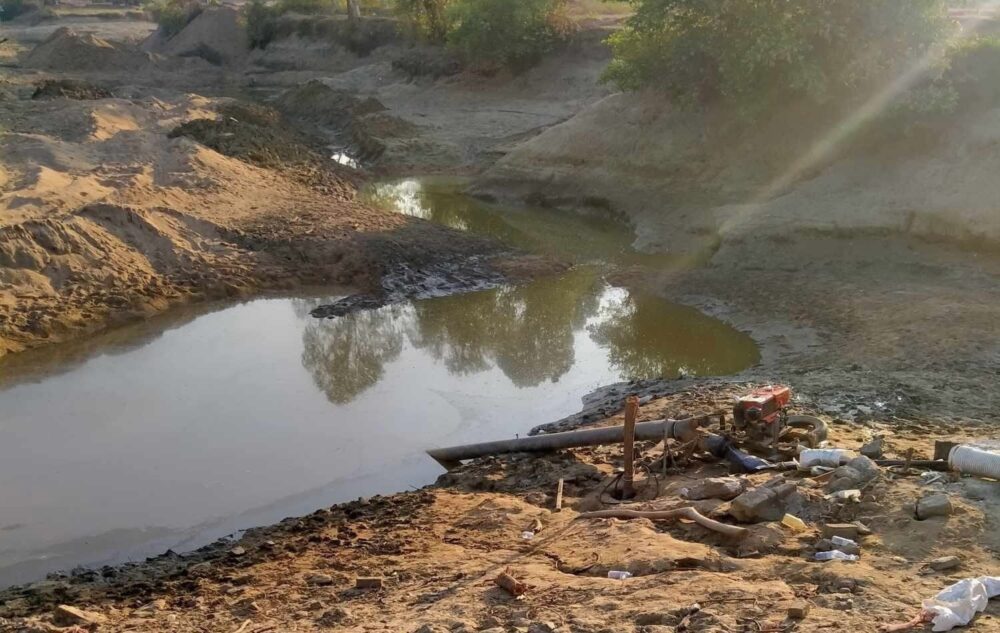When garment factories in Phnom Penh resumed operations last month after the lockdown, officials and factory owners insisted workers would be safe. Factories were to divide workers into two shifts to allow for adequate social distancing; and testing, tracing, and vaccinations would help contain the spread of COVID-19.
But in the month since the lockdown ended, coronavirus cases have once again nearly reached their late-April peak. Facing the highest rates of community spread, but too poor to miss work, factory workers say they feel they have little choice but to risk their health amid dangerous conditions.
“We clean our hands with alcohol and wear masks but we are still crowded together when we eat, use the bathroom, and work,” said Im Nen, a worker from Prek Pnov district’s Poansaing commune, in Phnom Penh.
A 40-year-old mother of four, Nen spends about an hour each day commuting to and from her factory in Kambol district. Like most workers, she pays about $12 a month to travel to work daily in a truck that holds scores of standing garment workers tightly packed together—the only affordable way for most to commute to work. Such trucks have long posed a danger to workers, with workers sometimes injured or even killed from accidents on overloaded trucks. But a lack of regulation means they remain the primary form of transportation, even amid a pandemic. Nen said that as much as workers would like to, it’s impossible for them to follow most of the Health Ministry measures surrounding social distancing.
“Yes, I’m afraid [of COVID] because there are 50 to 60 workers on a truck,” she said. But, she added, “If I stay at home…I won’t have enough money for eating.”
Living in the same commune, Yang Soyoeun, 40, said he is most concerned about catching the virus on the packed truck he takes to and from his factory each day. To prevent it from spreading to his wife and two sons, he said: “when I return home, I take off my clothes and wash them before entering the house.” Though he makes less than $200 a month, Soyoeun finds himself spending money he can’t afford on masks and alcohol in the hopes of preventing transmission. “I am always keeping good sanitation, but we can’t predict this [infection] because we can’t see it.”
Like other workers, Soyoeun said he had little ability to follow the Health Ministry’s guidelines and avoid crowds in or around his work.
“If I don’t go to work, I will face inadequate food and be unable to pay my debt,” he said. Though he fears catching COVID on a truck, “I don’t have my own transportation, I need to share a truck with others.”
As cases continue to spike, both he and Nen said they urged factory owners to give workers some paid time off to slow the spread.
“There is a risk that [cases] will happen when we remain having to travel in packed trucks,” he said.
On June 10, a number of communes in Pur Senchey district were designated dark yellow zones and given additional restrictions. The decision came after dozens of workers from the Grand Twins International factory in Pur Senchey district’s Choam Chao 3 commune tested positive for COVID-19
Those living in dark yellow zones are not allowed to leave their homes except to buy food and other necessities, or for work purposes provided they have permission from the Phnom Penh Municipal Administration.
But while the Grand Twins International factory was closed, neighboring factories have remained open, said workers.
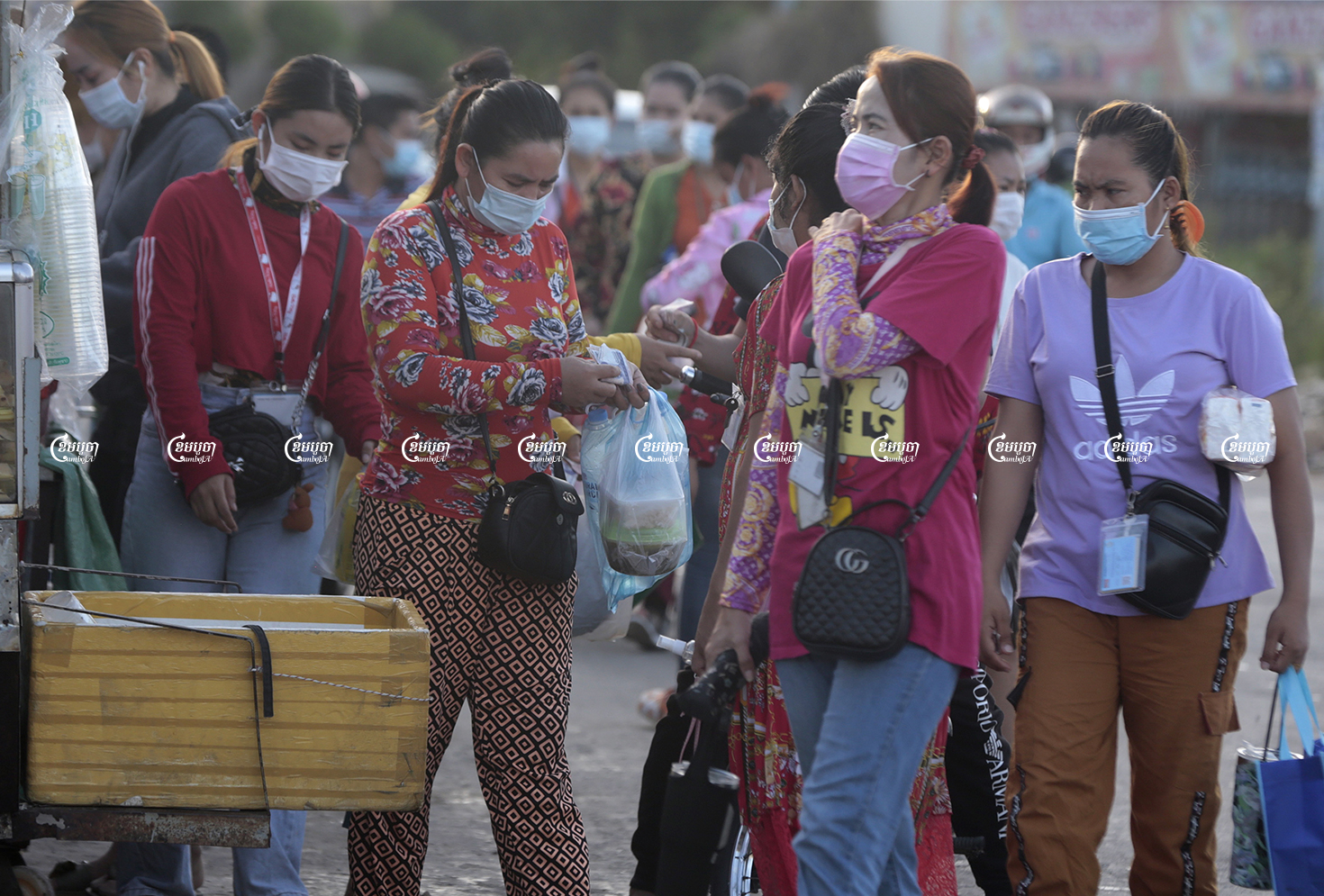
To Lang, 36, who works nearby, said she was concerned the virus could spread to her own factory and wished they would it close preemptively.
“I am afraid the virus will be able to get to my factory,” she said.
On Monday, the Ministry of Health reported 542 new cases of COVID-19, bringing the total count to 38,969 since the pandemic began in early 2020. The large majority of these cases have been recorded since February 20 — when the ongoing community outbreak began. The ministry has also recorded 32,967 recovered cases and 348 deaths from the virus.
Outside of Phnom Penh, hundreds of workers have tested positive for COVID-19 in factory-heavy areas of Kampong Speu, Preah Sihanoukville, Svay Rieng, Kampong Chhnang, Kampong Cham, Kandal, and Takeo provinces.
Pav Sina, president of the Collective Union of Movement of Worker, said that the current measures recommended by the Health Ministry aren’t being wholly implemented by factories and so it has been difficult to curb the infection of COVID-19 among garment workers.
Even when garment workers follow the measures in their own lives, “we can’t resolve the problem of the risk of infection because they are packed together while being transported [to work] and are gathering at the workplace,” he said.
“The important thing we should consider is to temporarily suspend operations and conduct testing of all workers, so we can cut infections and find the source of transmission,” he said, adding that he was concerned about the spreading pandemic placing more economic burden on workers.
Mann Senghak, vice president of Free Trade Union (FTU), said that the Health Ministry’s measures have not been effectively carried out at many factories, which remain crowded.
“We have seen they are still taking packed trucks which have caused community transmission,” he added.
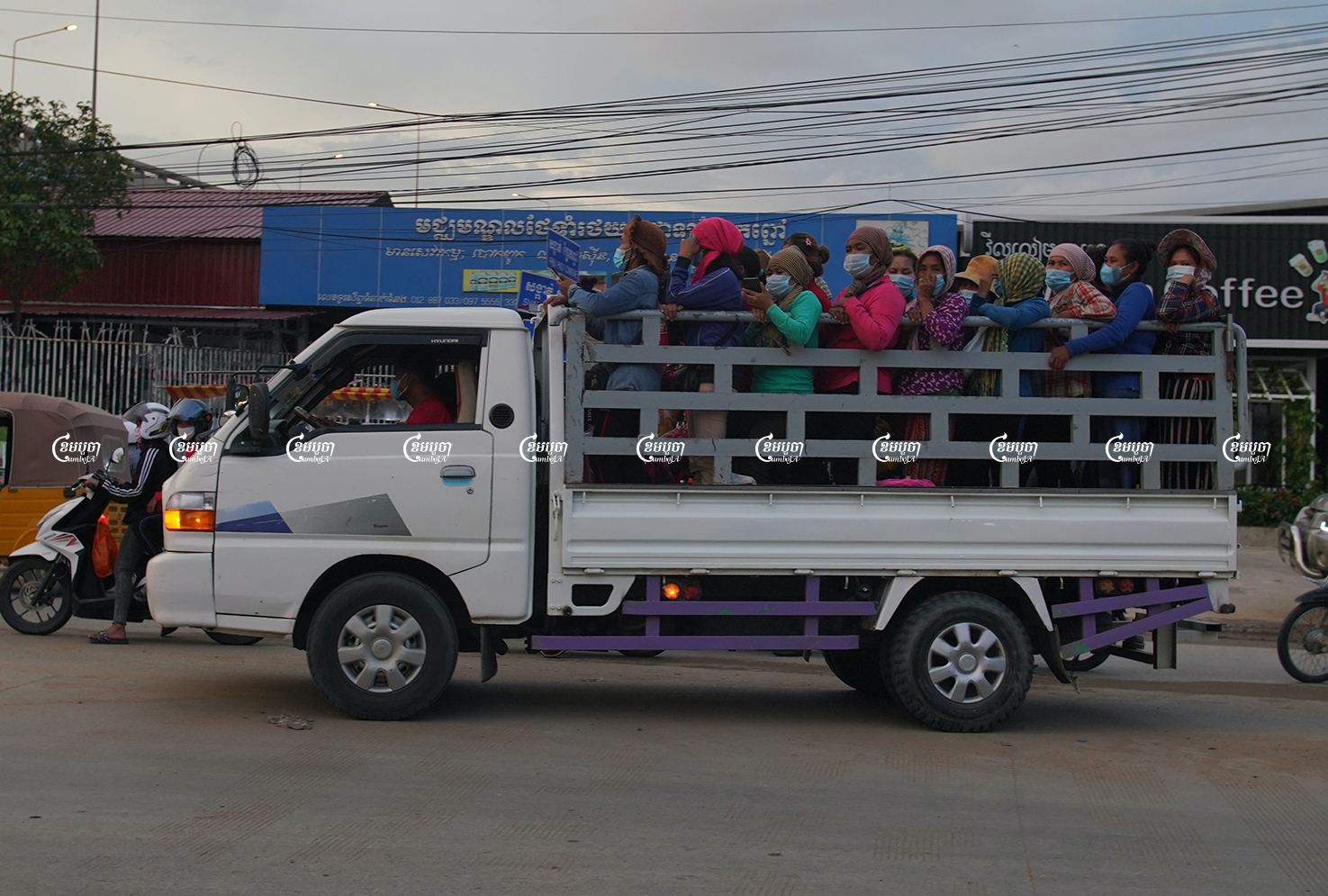
The Labor Ministry could not be reached for comment but Ken Loo, secretary-general at Garment Manufacturers Association in Cambodia (GMAC), insisted factories were following the measures put in place by the government.
“We are all concerned [about worker infections] but what we are doing is following the instructions from the Health Ministry and the government,” Loo said, adding that suspensions happen immediately when a number of workers test positive. Despite the urging of workers and unions, Loo said it wasn’t feasible to close factories preemptively.
“We can’t suspend [operations] when they haven’t detected the virus,” he said. “When factories cannot produce, we won’t have products being exported and the workers won’t receive a salary, so it will impact the economy if we halt operations,” he said.
“I believe that inside factories, they have a good measure to prevent workers,” he added.
Provincial health and labor officials have said the conditions inside factories make it difficult to control the spread of the virus.
“If they are still travelling together and they have failed to keep distancing, infections will continue,” said Keo Ratha, director of the Svay Rieng provincial health department.
Ou Sokhoeun, director of the Svay Rieng provincial labor department, could not be reached for comment, but on June 3 he told CamboJA that among the 921 recorded cases, more than 400 of them were factory workers. In total, more than 3,000 factory workers who had come into contact with infected individuals have had to quarantine.
“The reason for infection is because they are in one place together where it is difficult to keep social distancing. They travel together, work together and eat together,” Sokhoeun said. “Most of the infected people are factory workers and casino staff.”
Nuth Sinath, Takeo provincial health director, said workers “still risk [infection] because they ride on the truck together,” he said. “Our guidance remains to wear masks, clean our hands with alcohol, and keep our distance, and not crowd on the truck,” Sinath said. “It is effective in reducing infections.”
Vei Samnang, Kampong Speu provincial governor, urged garment workers to follow the Health Ministry’s measure to avoid crowded transportation to the workplace. But he admitted they had little alternative to offer them.
“We don’t have any measures because we do not know who dares to come up to buy vehicles separately for transporting workers,” he said.
“We don’t have a choice apart from keeping sanitary conditions, clean hands with alcohol, wear masks and don’t talk to each other too much.”


